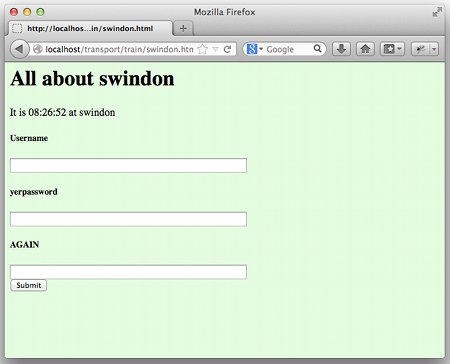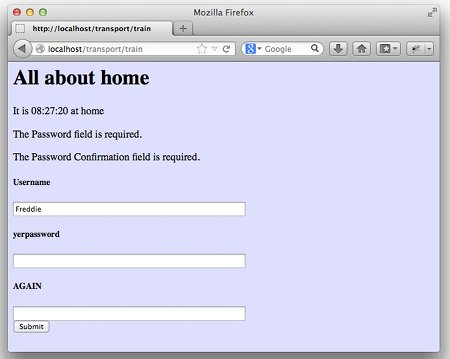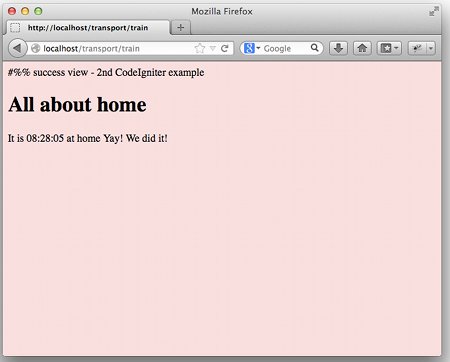
|
Training, Open Source Programming Languages |
| Home | Accessibility | Courses | The Mouth | Resources | Site Map | About Us | Contact |
| For 2023 (and 2024 ...) - we are now fully retired from IT training. We have made many, many friends over 25 years of teaching about Python, Tcl, Perl, PHP, Lua, Java, C and C++ - and MySQL, Linux and Solaris/SunOS too. Our training notes are now very much out of date, but due to upward compatability most of our examples remain operational and even relevant ad you are welcome to make us if them "as seen" and at your own risk. Lisa and I (Graham) now live in what was our training centre in Melksham - happy to meet with former delegates here - but do check ahead before coming round. We are far from inactive - rather, enjoying the times that we are retired but still healthy enough in mind and body to be active! I am also active in many other area and still look after a lot of web sites - you can find an index ((here)) |
|
Sessions, forms and validation in CodeIgniter - early examples
CodeIgniter is becoming a very popular PHP Framework and increasingly I'm being asked to use/show elements of it on private PHP training courses. All web based applications need certain elements of code such as form and session handling, data validation, routing of URLs to the appropriate script and separation of business logic from the look and feel of the page, and that's where a web framework come in, in addition to the base language such as PHP (or Ruby or Python or Perl). And CodeIgniter is a really appropriate framework for many of our customers, as it provides plentiful facilities in the major areas in which they're needed without too much bloat. I wrote a "Hello CodeIgniter World" article [here] just the other day, let's now extend that to take a look at forms and sessions. Sessions There's a need in most web applications to remember user's data from one page to the next, and at the same time to ensure that multiple users don't have their data mixed up with one another. There's a need to have that data secured, and cleared away if it's abandoned where someone leaves the site without completion a sale. PHP has a built in session system, but there's an improved one available in CodeIgniter. Before you can use it, you need to set a security key in application/config/config.php, for example: $config['encryption_key'] = 'My training key is easy - yours should be mixedup';You'll then load the session handler in your controller: $this->load->library('session');and you can read and save data using methods on the session object; here' an example that sets up a 'current' value if one doesn't exist and increments it each time the page is completed. More usually, you'll use session variables to store user names, products selected so far, and the like. $pagecount = $this->session->userdata('current');Form Validation CodeIgniter has a form validation system built in. Again, you need to load the form validator into your controller: $this->load->library('form_validation');and then you can set a whole load of rules: $this->form_validation->set_rules('username', 'Username', 'required');The rules can be applied in a single "hit", with the controller going on to produce either a refresh of the page for correction, or to save the data / update the model and proceed to the next page: if ($this->form_validation->run() === FALSE)Form Display Within a form, there's usually a requirement echo back a previous value, and the set_value method's provided to let you do that: <h5>UsernameHere's the initial form:  There' also a requirement to flag errors, and there's a validation_errors method to do that: <?= validation_errors() ?>Here's an output sample with some validation issues flagged:  There's far more flexibility than you'll see in this example - you can split the error messages out and put them with each input box if you wish, you can change the text and so on. Personally, I prefer to wrap up the repetitive elements of form boxes into my own function as that makes for easier maintenance later on, and ensures consistency across each input field. So in an extension of that code above, my input boxes become <?= box("Username","username") ?>and there's an extra function provided: function box ($prompt,$name) {And finally the success page:  Links to source code: Complete controller - [here]. View form - Mark 1 - [here] View form - with function - [here] Success page - [here] Sample routing (via .htaccess) - [here] (written 2013-04-13, updated 2013-04-20) Associated topics are indexed as below, or enter http://melksh.am/nnnn for individual articles H321 - PHP - CodeIgniter[4053] Frameworks - learning through exploring and understanding data sources - (2013-03-27) [4060] CodeIgniter - an excellent PHP framework with an easy start point - (2013-04-06) [4114] Teaching CodeIgniter - MVC and PHP - (2013-06-12)
Some other Articles
MVC and Frameworks - a lesson from first principles in PHPHandling requests to a forum - the background process Apache httpd - a robust, open source web server Backups by crossover between network centres - setting up automatic scp transfers Sessions, forms and validation in CodeIgniter - early examples Seamless, integrated IT - we have a long way to go! Curl and curling from PHP The highs and lows of customer service - Cheltenham stdClass in PHP - using an object rather than an associative array |
4759 posts, page by page
Link to page ... 1, 2, 3, 4, 5, 6, 7, 8, 9, 10, 11, 12, 13, 14, 15, 16, 17, 18, 19, 20, 21, 22, 23, 24, 25, 26, 27, 28, 29, 30, 31, 32, 33, 34, 35, 36, 37, 38, 39, 40, 41, 42, 43, 44, 45, 46, 47, 48, 49, 50, 51, 52, 53, 54, 55, 56, 57, 58, 59, 60, 61, 62, 63, 64, 65, 66, 67, 68, 69, 70, 71, 72, 73, 74, 75, 76, 77, 78, 79, 80, 81, 82, 83, 84, 85, 86, 87, 88, 89, 90, 91, 92, 93, 94, 95, 96 at 50 posts per pageThis is a page archived from The Horse's Mouth at http://www.wellho.net/horse/ - the diary and writings of Graham Ellis. Every attempt was made to provide current information at the time the page was written, but things do move forward in our business - new software releases, price changes, new techniques. Please check back via our main site for current courses, prices, versions, etc - any mention of a price in "The Horse's Mouth" cannot be taken as an offer to supply at that price.
Link to Ezine home page (for reading).
Link to Blogging home page (to add comments).
PH: 01144 1225 708225 • EMAIL: info@wellho.net • WEB: http://www.wellho.net • SKYPE: wellho
PAGE: http://www.wellho.net/mouth/4062_Ses ... mples.html • PAGE BUILT: Sun Oct 11 16:07:41 2020 • BUILD SYSTEM: JelliaJamb